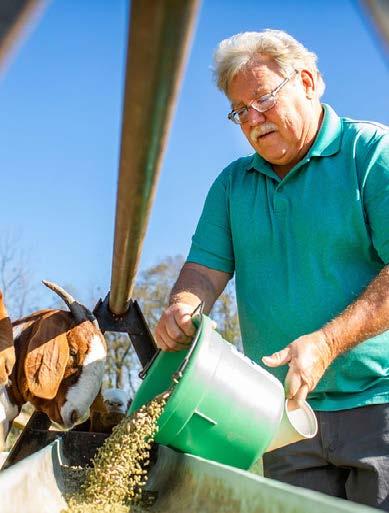
7 minute read
Shaping Young Ag Minds as a Duo
Story and photos by Andrea Haines
Only some of us are lucky enough to find that special person in life who shares our particular interests. It’s often a treasured hobby or mutual affiliation that brings people together, but for Ed and Tonjia Mayne of Union Bridge, Maryland, the future of agriculture encapsules their existence.
Advertisement
Now retired, Ed and Tonjia have advised young minds for 34 years as agriculture educators at various high schools in the Frederick County, Maryland area. Ed grew up on a small grain and turf farm in a neighboring county, where he also raised 4-H and FFA breeding and market pigs. Having a strong passion for agriculture, Ed enjoyed competing at the county and state levels each summer, which led him to continue his interests into his career, teaching at Boonsboro High School from 1976 to 1980, and then Frederick High School in 1983 to 2017.
Tonjia remembers her days as an agriculture student and FFA member as being enjoyable. “I was inspired by my teachers and advisors and their dedication to agriculture education,” she shares. Her teaching career began at Catoctin High School from 1985 to 1992, following with Linganore High School in 1994 to 1996, finishing at Urbana High School from 1999-2020.
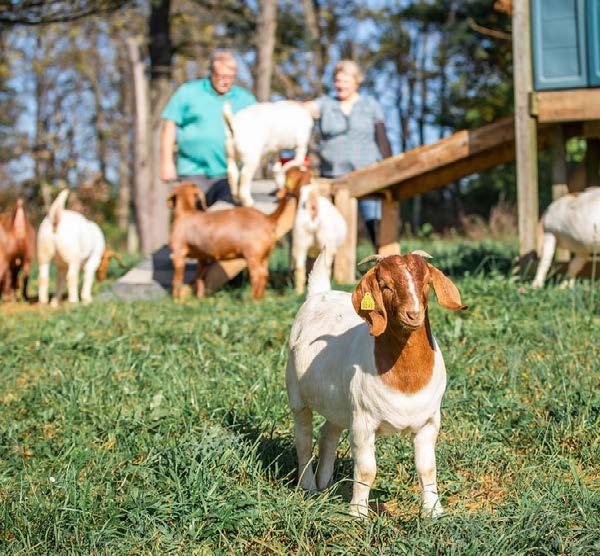
Ed and Tonjia even owe their marriage to agriculture education. Ed explains, “We met at a drive thru window at a McDonald’s near the [Chesapeake] Bay Bridge. We were both headed to the summer agricultural teachers’ conferences being held at Salisbury University.” They’ve been happily married for years and have a farm, kids (two and four-legged), and a pet boarding kennel to show for their coincidental encounter.
The Mayne family breeds, shows, and sells Boer (meat) goats. “We purchased our property in 2016,” shares Ed. “We were introduced to the past owner, Linda Ramond, by her son and daughter-in-law where we attend church. Their son was housing his 4-H market goat project at our barn at our original property. We leased some barn space from the prior owner to house our yearlings in 2015. One beautiful afternoon we were caring for our does and Linda stopped by the barn. We shared with her how beautiful we thought her property was and how we would like to know if she ever wanted to sell. She shared that she had been interested in selling and that she wouldn’t put it on the market so that we could purchase the property outright. It was definitely a ‘God moment’ for us to get this property.”
The Maynes were always hopeful that someday they would own a farm to raise their family and goats. This property had that and more, including Sunchaser Farm Kennels, instated in 1987. “The owner was hopeful the new owners would continue boarding and grooming dogs,” shares Tonjia. “We immediately knew this would be a natural fit — our experience with owning a pet-sitting business, raising livestock, plus teaching pre-vet animal care had prepared us well.”

Upon this news of purchasing the farm, Ed and Tonjia started to plan a finance strategy. “Our initial loan was to purchase the land and our home,” explains Ed. “We worked with our loan officer, Kelsey Maslen, when it became necessary to replace the existing barn and make renovations to the property with new fencing, replacing roofs, and upgrading heating systems in our kennel.” Tonjia elaborates, “Farm Credit has been amazing. We also worked with them when COVID-19 hit, which affected our kennel business. They walked us through the process of applying for PPP loans and forgiveness applications.”
“Having the space to expand their goat operation was a big driver for purchasing the property. Our first big project was providing funds for their barn,” explains Kelsey. “Since they purchased the farm, both have retired from serving as ag teachers, but it does not mean they have stepped back from helping the community. I would say, working with the Maynes feels like a partnership, and I’m glad to serve as a resource for them.”
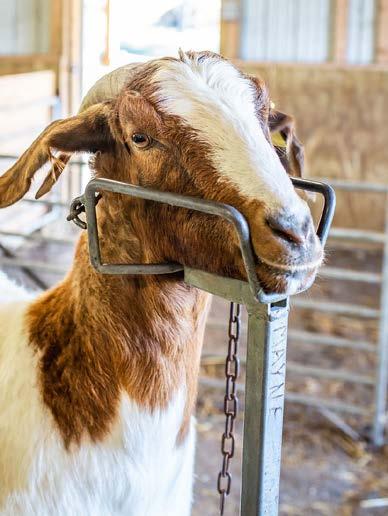
The Maynes credit working with Farm Credit as being “so easy” and “always available” to answer questions and help with all financial needs. “We chose to go with Farm Credit because they understood our needs and the uniqueness of the property we were purchasing, and knowing the financial needs involved with operating a farming business. Since they are a cooperative, we are able to benefit from profit sharing,” mentions Ed.
He adds, “It is such a good feeling to walk into the Farm Credit office or other ag cooperatives and see some of your students working in high skill-level positions, too.” Ed refers to teaching ag like being a missionary in another country, “You can only share your passion and knowledge and hope that the seed you planted in their minds comes full harvest.”
Kelsey reflects, “I knew them as ag teachers from my time in FFA both as a high school student and as a state FFA officer. They have helped so many students, and I’m glad I could be able to bring it full circle and help them in return.”
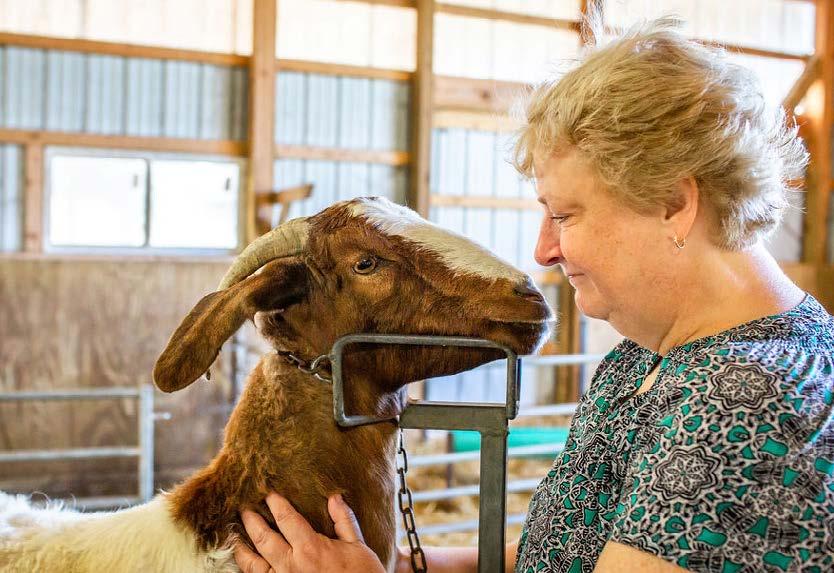
Ed enjoyed preparing students for competitions and seeing how it would improve communication skills and team building. “Three of my favorite contests were milk evaluation (dairy foods), floriculture, and public speaking contests,” he shares. “Tonjia and I would team coach. She would help train my students in land evaluation and I would help train her dairy foods team.”
Tonjia shares, “Students were always my motivation for teaching. To teach and to be a positive role model was my goal. If you are a good person with good morals, and a loving heart, those around you will be drawn to that and develop their own positive character traits.” She notes, “Agriculture is the backbone of life, as everything stems from it. To see students get excited and to find their place in this great industry is why I devoted 34 years to teaching.” For her, pre-vet (animal science) classes were a great opportunity to provide students with hands-on experience in and out of the classroom, resulting in a more solid direction for career-based decisions.
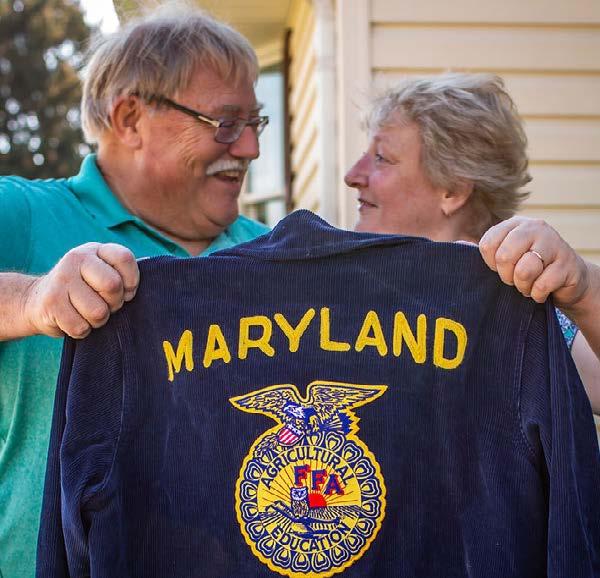
“Land evaluation was also a favorite topic/contest to help students learn to appreciate the importance of soil, not only for food production, but for structure for roads and construction of homesites,” she explains. “I have so many students that I still see and are involved in the agriculture industry.” Not only did Ed and Tonjia teach agriculture education to students, but also implemented a passion for the industry into their own children, too.
“When our children were old enough to join 4-H, they started their livestock projects by raising market hogs,” explains Ed. “Our youngest daughter, Katie, fell in love with three Boer goat kids she saw at the fair, and with mom’s encouragement, decided she wanted to raise goats along with her market hogs.” Soon, all three of their children became involved in raising market goats, and Katie added two breeding does to the herd.
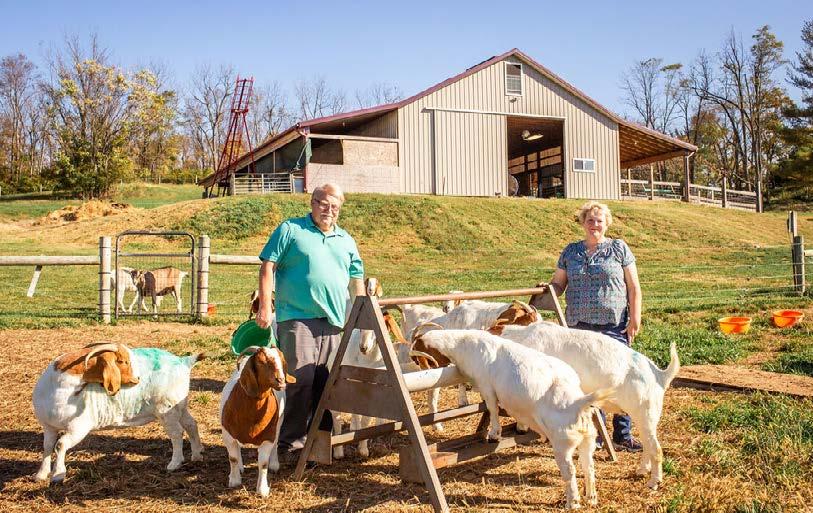
“We have continued growing our herd after the kids were out of 4-H and FFA,” adds Tonjia. “Currently, we have 50 head of registered South African Boer goats and a herd of 25 recipients that we use in our embryo transfer program. Our focus is to raise structurally correct, productive animals that can be used in breeding programs to help improve the breed. In 2018, we began using embryo transfer which has helped to improve our herd genetics.” The family shows their animals in regional American Boer Goat Association (ABGA) shows in Pennsylvania, Delaware, Virginia, and West Virginia, as well as local and state fairs.
“The Maynes are always busy,” shares Kelsey. “They stay connected with their past ag students, and help those currently involved. They love to share their goat knowledge with others and are constantly inviting others out to the farm to facilitate hands-on learning.” It is clear that no matter what direction the Maynes choose to pursue, agriculture will most likely be forefront and they will always strive to ‘hold true to the best traditions… and to be an influence in their home and community’,” just as E.M. Tiffany (FFA Creed author) would adore.
Follow Sunchaser Kennels on Facebook: @SunchaserKennels
